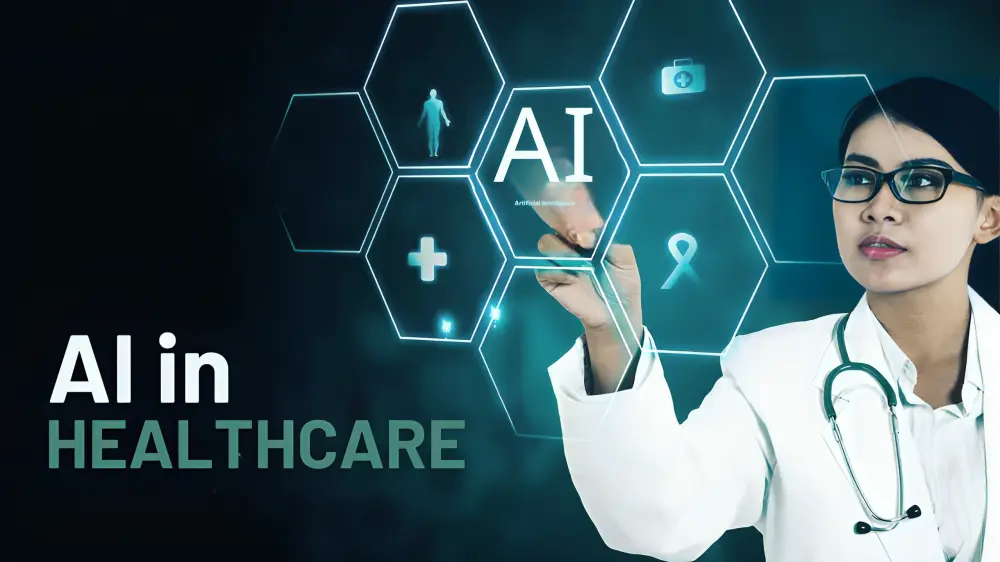AI in Healthcare is revolutionizing several industries, including healthcare. Artificial intelligence (AI) can help with patient care, diagnosis, and treatment because of its enormous data processing capacity. This article examines the fundamentals of artificial intelligence AI in Healthcare, as well as its possible advantages, difficulties, and prospects.
Why is AI in healthcare the future?
Artificial intelligence (AI) is becoming more and more prevalent in the healthcare sector worldwide. A portion of this is due to the healthcare sector’s shift to managing data in the cloud; with the cloud, data is now available in real time for additional analysis. However, artificial intelligence makes it possible for a much more effective—and, in many cases, much more accurate—process to be carried out without depending on employees to painstakingly go through data. Predictive modeling, automatic report generation, and other AI features are becoming more and more beneficial to integrate into everything from internal operations to medical records.
How AI Works?
It is helpful to comprehend the operation of artificial intelligence prior to discussing how it has evolved in the healthcare industry. In essence, artificial intelligence (AI) refers to computer models and programs that mimic human intelligence to carry out cognitive tasks like experience gathering and complex problem-solving.
The term “Narrow AI” refers to the majority of modern AI tools, which indicate that the technology can surpass humans in a specific kind of task. Machine learning algorithms underpin a lot of contemporary strategies. Computers can now learn, carry out tasks, and adapt without the need for human intervention thanks to machine learning.
Looking to the Future
- Better AI-powered predictive care: Better information will assess the likelihood and risk of a person getting sick in the future.
- Connected care: AI in healthcare will facilitate system connectivity and pattern recognition. This will make it possible for data to be seamlessly shared across a network, from anywhere. Globally, this shared data and information will establish life-saving connectivity.
- Improved patient and staff experiences: As AI develops, it will continue to enhance the experiences of patients and providers, cutting down on patient wait times and increasing overall system and hospital efficiency. Hospitals are using CORTEX to use AI to handle tasks that are best suited for automation, freeing up time for people to perform tasks for which they are best suited: delivering first-rate patient care.
The Benefits of AI in Healthcare and Medicine
- AI can identify cancer or tumor treatments with precision and separate treatment options for patients with genetic abnormalities. Future clinical decisions benefit from the resulting insights.
- Thirty percent goes toward administrative expenses in healthcare. These include pre-authorizing insurance, tracking down delinquent bills, and keeping track of patient records. AI can separate and automate these tasks. This reduces costs and lightens the staff’s workload.
- Every patient has a unique diagnosis and course of treatment, regardless of the standard worldwide protocols. This produces enormous amounts of data that are challenging to manually analyze. AI can perform predictive analysis and gather patient insights, resulting in faster patient care and the identification of critical areas that need improvement.
The Applications of AI in Healthcare
- Medical imaging analysis: AI is used by cardiologists and radiologists to analyze scans and images for critical information. They can prioritize urgent cases and prevent mistakes when reading electronic health records (EHRs) thanks to this.
- Forecast disease: In addition to saving hospital patients’ lives, early disease detection and treatment can lower the cost of any ongoing medical care. To develop a disease prediction model for chronic illnesses, several AI and predictive analytics models are being tested.
- Cancer research and treatment: There is no digital database for radiation therapy to gather and arrange EHRs. AI gathers pertinent medical data, assesses the standard of care, and improves treatment outcomes using data from oncology and imaging.
- Discovery and development of genetic medicine: AI helps in the quick discovery and development of highly effective medications and vaccines. It also forecasts changes in molecular phenotypes, like protein binding, and the probability of any hereditary illnesses.
- Drug discovery: Terabytes of biological data are produced by AI by fusing the finest aspects of biology, data science, and chemistry. The algorithm can run over a million experiments every week with the help of this data, which will speed up drug discovery and make it simpler to identify which drugs have toxic potential.
Conclusion
AI has the potential to completely change the healthcare industry by improving diagnostic accuracy, expediting procedures, and improving patient care. AI technologies will enable real-time data sharing, automate administrative tasks, and enable predictive modeling as they advance. Significant improvements in treatment outcomes and operational efficiency are promised by embracing AI in healthcare.
